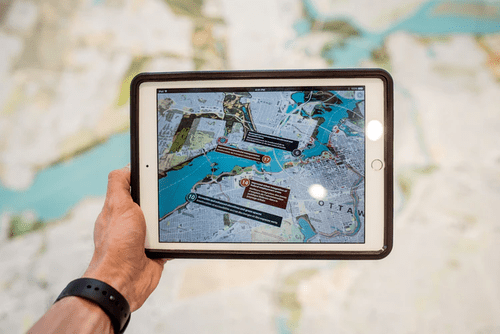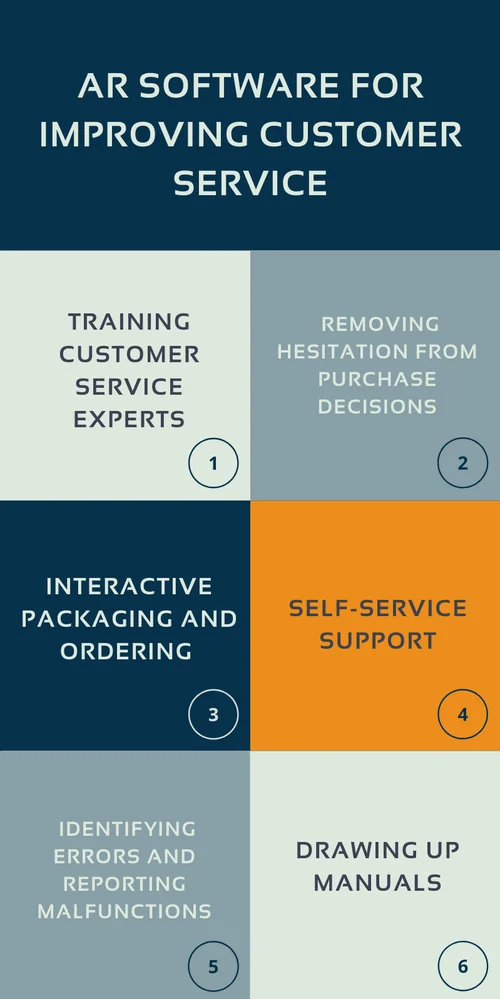Augmented Reality software to Attract More Customers


Do you want to create buzz around your brand? The augmented reality software serves various businesses with unmatched excellence. Statistics show that AR-based solutions are particularly sought-after in eCommerce, Marketing, and Gaming. One of the most striking examples is using the tech to enhance customer experience, and attract potential clients. So how can you generate constant interaction with customers? Before answering this question we should go with the AR definition.
Augmented reality works to supplement reality with the help of additional digital elements. In other words, the tech overlays computer-generated content onto the customer’s view of the world. That is how exactly Pokemon Go operates. Users can see pokemon on their screens through the lens of the camera. It is time to consider how various businesses apply the tech.

According to the Drum report, 42% of customers suppose that using AR tech shortens the time from browsing items to buying. In 2012, Converse experimented with AR to let their clients try shoes and see how they would look in footwear. Today, Nike Fit represents a more advanced scanning app that allows to measure the size and shape of a customer’s feet and make the right choice. It is only a partial list of implementing try before you buy approach. We are moving to other bright examples.
1. Fashion
Way back in 2018, Gap created an app that helps clients to try on outfits online. All you have to do to start using augmented reality techniques is to choose one of five body types, integrated into the Gap app.
During New York Fashion Week 2018, guests of a fashion show by H&M and Moschino utilized AR to scan collections and buy items promptly.
2. Accessories
Warby Parker designed the app to help users try sunglasses virtually. Besides, the solution is quite unique, as it doesn’t need photos of the customers for overlaying glasses. Thanks to a 3D preview of users’ faces, people can turn their heads and find out if pairs of glasses suit them from several angles.
3. Cosmetics
MAC cosmetics decided to add a virtual try-on option in makeup tutorials. So when you watch your favorite blogger, AR applications give you a chance to see how you look with the same lipstick or eyeliner.
4. Furniture and home decor
There is no gainsaying that DecorMatters transformed the way people buy pieces of furniture. The app focuses on redefining interior design. To be more specific, it allows people to redesign their rooms, starting from changing paints on the walls to renovating furniture itself. In such a way, users can download various pieces of furniture from IKEA, Amazon, Wayfair, Crate & Barrel, and West Elm. The app also has a ruler for measuring the free space of your room before buying items.

Numerous users are eager to contact service agents while lodging a complaint, browsing catalogs, or buying products. That is why efficient training is a necessity, especially when it comes to selling a wide range of products. By using AR models you can make a real product’s replication you can train your employees much faster. AR tech also helps customers to view and test items digitally. The app by Lowe is an example of adopting technology in this way.
Customers are not able to examine the product physically before buying it. This results in considerably high return rates. Augmented Reality App Development is a key to preventing a large number of returns. If a potential buyer understands how the item impacts his daily life, he will be less likely to return it.
If you’re thinking about creating interactive packaging, then you still need to implement AR. The concept provides existing and potential customers with a valuable and engaging experience. By touching the iPhone button, they can see visuals with some practical insights. That is how Heinz presents a multitude of recipes using their tomato ketchup. Cereal makers, namely Wheaties and Nesquik entertain young customers via AR, designing small games to play during breakfast.
Speaking about other augmented reality advantages, we cannot fail to mention reporting various faults. Sometimes it’s hard for customers to explain what is wrong with the product to a service expert. For this reason, enterprises offer clients to take full advantage of the app for malfunctions reporting. The user just needs to hold the phone to the damaged product’s part and view the image in real-time. So the customer service agent can understand the whole thing in the blink of an eye.
Augmented reality comes in handy when you need to write help sheets or FAQ pages for your clients. Basically, you can transfer this responsibility to the tech and free up your employees’ time. As you can see, using AR isn’t limited to online shopping. For example, Mercedes has created a virtual assistant for diagnosing and solving car problems. Drivers can scan their vehicles to get an explanation of the functionality and cars’ features. You may also combine the AR element with an AI chatbot to achieve a convenient and user-friendly interface.
It’s no wonder that AR manuals don’t leave any chance for bulky booklets. When you need to perform the routine car task, there’s nothing better than pointing your phone at the part of the vehicle and getting all the necessary instructions. Meanwhile, if car manufacturers provide the customer with additional support, it encourages clients to repeat purchases.
To sum up, the augmented reality remains a powerful tool for customizing products and creating personalized experiences for clients. What is more, AR gives endless opportunities for market leaders to integrate products into clients’ reality before purchasing. The tech is no longer associated with the gaming industry only. According to the statistics, the global augmented reality market is expected to reach around $61.39 billion by 2023. Nowadays, numerous enterprises have already found success in implementing AR into their e-commerce and physical stores. Timberland, Sephora, Topshop, Lowe’s, and Lacosta – the list goes on and on. Do you want to join global companies of different fields? Stay abreast with cutting-edge techs, including AR.

PNN Soft provides clients with high-quality programming products. We deliver stable projects for different industries, including mobile AR apps. The company has 20 years of experience in creating highly efficient solutions, but we are continually honing our skills to deliver advanced techs and products. Security is our primary concern when it comes to your digital transformation.
We are determined to seek innovative solutions that meet individual companies’ needs. That is why we know what technologies spell success for your business today.
PNN Soft takes full advantage of RAD, Scrum, and Agile methodologies to ensure constant communication with customers and build a flexible development process. Our Agile-teams of professionals include software developers, testers, GUI designers, technical writers, and managers.
If you want to hire a dedicated development team for AR software development, fill in the form below.